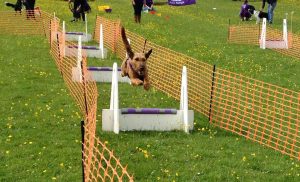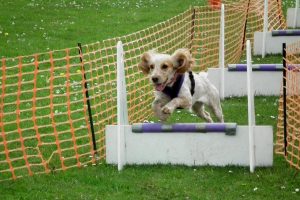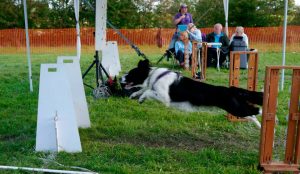Flyball
03/09/2016
When it comes to high energy activities for dogs, flyball ticks all the boxes. Action, skill and fun, it has them all. What exactly does flyball entail? Who can have a go? And where can you try it out? We got in touch with Jacqui Smith and Bev Rutherford, secretary and treasurer respectively of the Teesdale Flyball Club, to find out more. The Teesdale Flyball Club have even competed in flyball at Crufts, so they know all the ins and outs of the activity.
In the sport of flyball, the team of dogs run in relay down a short course of hurdles to retrieve a ball at the end. The ball comes from a specially designed box, which has a pedal for the dogs to push to release the ball for them to catch. The activity is a great way to meet other dog owners and keep active. It exercises dogs mentally as well as physically. Teams can also compete locally, regionally and nationally.
Having grasped the basics, I asked Jacqui a few questions to find out more.
There seem to be a lot of high energy dogs, such as collies, participating in flyball. Are certain breeds better suited to flyball than others?
Yes, Collies are great for flyball due to their work drive and speed. Most dogs like to work though, which is why we welcome all breeds of dogs and have a great variety in our club at the moment. Obviously some are quicker than others, but they all want to learn and are eager to please.
All flyball teams in the UK are members of The British Flyball Association. The BFA allocates each team into their own divisions, where they are matched equally by speed. This means all dogs have a chance to race no matter how fast or slow they are, allowing for all breeds to compete.
We know that a dog’s behaviour can suffer without enough physical and mental exercise. Would you recommend flyball for dog owners who are struggling with behavioural issues?
We ask that the dogs have basic recall when starting their flyball training. Whilst we don’t expect every dog to be perfect we do work with owners if there is a behavioural problem, eg a dislike to other dogs, shyness or dislike to humans. We have had great success in all of these areas through one to one training. However we are not an obedience training group and can only help certain mild behavioural issues. We certainly recommend that all dogs try some form of sport and flyball is no exception.
Are there any skills that dog owners need to have to take part? How fit do owners need to be?
All our club asks regarding skills is that you are passionate about your dog and want to be part of a winning club and team. Fitness is always a good thing as we do have you running to collect balls etc. I have been to competitions and seen a lady in an electric wheelchair competing with a very obedient spaniel and they were both having fantastic fun. Again, it would all be club dependent, but it is a great way to stay fit. Enthusiasm and patience is more important as well as regular attendance.
Do any of the club members recommend a particular diet or dietary supplements to keep their dogs in peak condition? Such as a diet high in protein or a bone and joint supplement.
Each dog owner has their own particular dog diet as some of our dogs are household pets but some may be working dogs. We don’t necessarily give out dietary advise unless we are asked by an owner who may be having problems with their current dog food or perhaps the dog is a bit too overactive. We are happy however to pass on our experience in this area to help them out so they can choose one to try.
I’m impressed that the Teesdale Flyball Club competed at Crufts. How does a club reach those heights?
Our club competed at Crufts with very dedicated dogs and owners. Having had to complete numerous heats all over the country to qualify, the close-running team won their way into the centre ring at Crufts. There are Crufts qualifiers throughout the country and these are open to all teams. We qualified at one of those qualifiers in Scotland in 2011 for Crufts 2012. We won the overall quarter final heats to reach the semi finals.
How would someone take part in flyball?
With many thanks to Jacqui Smith for answering my questions and Bev Rutherford for providing images of the Teesdale Flyball Club.
Gilbertson & Page recommends that any dog taking part in high impact activities such as flyball eats a dog food containing a bone and joint complex, such as Gilpa Super Mix or Dr John Titanium. New Zealand green-lipped mussel extract is a natural source of glucosamine and chondroitin, which will help to maintain bone and joint health, whilst the Manganese in these formulations is important for ligament health.






